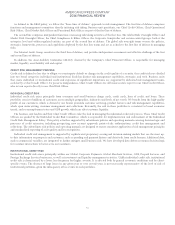American Express 2014 Annual Report Download - page 59
Download and view the complete annual report
Please find page 59 of the 2014 American Express annual report below. You can navigate through the pages in the report by either clicking on the pages listed below, or by using the keyword search tool below to find specific information within the annual report.AMERICAN EXPRESS COMPANY
2014 FINANCIAL REVIEW
with merchants would not be capped, but the interchange caps would likely exert additional downward pressures on merchant fees across
the industry, including our discount rates, and may undermine our ability to attract and retain GNS partners. The Interchange Fee
Regulation would exclude commercial card transactions from the scope of the caps.
폷Card acceptance terms —“Anti-steering” and honor-all-cards rules across all card networks, including non-discrimination and honor-all-
cards provisions in our card acceptance agreements, would be prohibited with some limited exceptions. Removal of these provisions
creates significant risk of customer confusion and Card Member dissatisfaction, which would result in harm to the American Express
brand. The prohibition on “anti-steering rules” would take effect immediately upon effectiveness of the regulation; the prohibition on
honor-all-cards rules would take effect one year later.
폷Network licensing — Beginning six months after the regulation would become effective, the geographic scope of network licenses,
including those we agree to with our GNS partners, would cover the entire EU. This may undermine the value of licenses granted to some
GNS partners to date, which have been subject to varying levels of exclusivity in relation to a particular country.
폷Separation of network processing — Beginning one year after the date the regulation would become effective, card networks would be
required to separate their network processing functions (in which transactions between different issuers and acquirers are processed for
authorization, clearing and settlement). This proposal does not apply to three-party payment networks, such as American Express, but may
be deemed applicable in situations where a different GNS issuer and acquirer is involved in a transaction, which represent a very small
percentage of transactions on our network.
폷Co-badging of cards — Beginning one year after the regulation would become effective, a single card may bear the brand of multiple
networks and be used to process transactions on any of those networks. Merchants may install automatic mechanisms in point-of-sale
equipment to prioritize selection of a particular network, subject to override by the cardholder. These provisions may harm the American
Express brand insofar as GNS issuing partners will be able to offer multiple networks on a single card and merchants may program their
point-of-sale equipment to prioritize selection of another network on such cards.
The Commission’s PSD2 proposal has been considered by both the Parliament and the Council; however, the trialogue process has only
recently begun. Among other terms, the PSD2 could include in its final form provisions that would (i) further regulate surcharging so that
transactions falling in scope of the interchange caps could not be surcharged, but transactions falling outside the scope of the caps could be
surcharged up to cost, subject potentially to the ability of an individual Member State to prohibit surcharging altogether; and (ii) require all
networks, including three-party payment networks that operate with licensing arrangements, such as our GNS business, to establish
objective, proportionate and non-discriminatory criteria under which a financial institution may access the network, for example, as a
licensed issuer or acquirer. The former may increase instances of differential surcharging of our cards and prompt customer and merchant
confusion as to which transactions may be surcharged and Card Member dissatisfaction. The latter would undermine the flexibility and
discretion we have had to date in deciding with whom to partner in our GNS business. Unlike the Interchange Fee Regulation, the PSD2
would require transposition into national law by each Member State, likely over a period of two years.
Dodd-Frank Wall Street Reform and Consumer Protection Act
The Dodd-Frank Wall Street Reform and Consumer Protection Act (Dodd-Frank) contains a wide array of provisions intended to govern the
practices and oversight of financial institutions and other participants in the financial markets. Among other matters, the law created an
independent Consumer Financial Protection Bureau (the CFPB), which has broad rulemaking authority over providers of credit, savings,
payment and other consumer financial products and services with respect to certain federal consumer financial laws. Moreover, the CFPB has
examination and enforcement authority with respect to certain federal consumer financial laws for providers of consumer financial products
and services, including American Express Company and certain of our subsidiaries. The CFPB is directed to prohibit “unfair, deceptive or
abusive” acts or practices, and to ensure that all consumers have access to fair, transparent and competitive markets for consumer financial
products and services.
The review of products and practices to prevent unfair, deceptive or abusive conduct will be a continuing focus of the CFPB and banking
regulators more broadly, as well as our own internal reviews. Internal and regulatory reviews have resulted in, and are likely to continue to
result in, changes to our practices, products and procedures. Such reviews are also likely to continue to result in increased costs related to
regulatory oversight, supervision and examination, and additional restitution to our Card Members and may result in additional regulatory
actions, including civil money penalties.
59
























